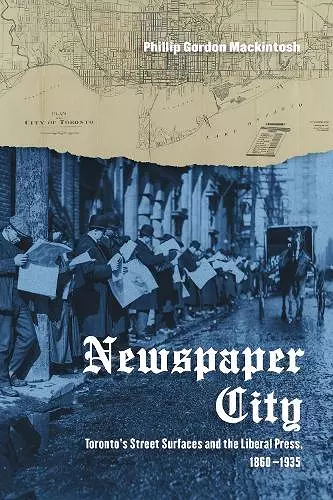Newspaper City
Toronto's Street Surfaces and the Liberal Press, 1860-1935
Phillip Gordon Mackintosh author
Format:Hardback
Publisher:University of Toronto Press
Published:7th Apr '17
Currently unavailable, and unfortunately no date known when it will be back

"This is a provocative and original take on the modernity of the North American city in general, and Toronto in particular. Mackintosh's sound scholarship and command of a wide-ranging literature underpin his trenchant exposure of the contradictions of liberal modernity, alerting us, too, to the continuing clash between civic humanism and neoliberalism in the conduct of city life." -- Richard Dennis, Professor Emeritus, University College London "Using the daily press as a prism, Phillip Mackintosh offers us a sophisticated interpretation of the paradoxical impulses that have shaped the modern North American city. His fresh view of Toronto brings cities into conversation about what has been called Canada's 'liberal order', in the process challenging Canadian and urban historians alike." -- Richard Harris, Professor of Geography, McMaster University "Newspapers are our richest sources for nineteenth- and twentieth-century urban history, but because they had agendas of their own, newspapers make risky source material. Phillip Gordon Mackintosh responds by recognizing papers not merely as records but as agents of change. In a "newspaper city" such as Toronto, papers stood in for the lost social control agents of the village, striving to reconcile modern commerce with traditional norms for readers and advertisers who depended upon both Mackintosh offers us a high-resolution urban history that will help us better appreciate newspapers' part in shaping the history they document." -- Peter Norton, Associate Professor, University of Virginia
In Newspaper City, Phillip Gordon Mackintosh scrutinizes the reluctance of early Torontonians to pave their streets. Consequently, Mackintosh's study reveals the contradictory nature of newspapers and the historiographical complexities of newspaper research.
In Newspaper City, Phillip Gordon Mackintosh scrutinizes the reluctance of early Torontonians to pave their streets. He demonstrates how Toronto’s two liberal newspapers, the Toronto Globe and Toronto Daily Star, nevertheless campaigned for surface infrastructure as the leading expression of modern urbanity, despite the broad resistance of property owners to pay for infrastructure improvements under local improvements by-laws. To boost paving, newspapers used their broadsheets to fashion two imagined cities for their readers: one overrun with animals, dirt, and marginal people, the other civilized, modern, and crowned with clean streets. However, the employment of capitalism to generate traditional public goods, such as concrete sidewalks, asphalt roads, regulated pedestrianism, and efficient automobilism, is complicated. Thus, the liberal newspapers’ promotion of a city of orderly infrastructure and contented people in actual Toronto proved strikingly illiberal. Consequently, Mackintosh’s study reveals the contradictory nature of newspapers and the historiographical complexities of newspaper research.
"Mackintosh brings to life a time when newspapers were essential building blocks in the development of cities. Newspapers provided a common information base for citizens to form opinions about how their city should develop; they were a critical element of democracy even though, as the author suggests, the actual decision makers were an elite group of city burghers closely linked to the newspaper owners."
- Beth Haddon (Literary Review of Canada, July/August 2017)‘This book is a worthwhile read for anyone interested in the role of the press in urban reform, or the way in which new infrastructure technologies change the look, feel, and function of the modern city.’
- Daniel Ross (Historical Geography vol 45:2017)"Phillip Mackintosh has very serious doubts about liberalism, and in this study of the debate surrounding the improvements to the street surfaces of Toronto and the actual improvements themselves, he takes aim at the liberal press in the city, in particular at the Globe and the Daily Star (titles still with us, if living rather precariously these days.)"
- David Hutchison, Glasgow Caledonian University (British Journal of Canadian Studies, vol 31 nISBN: 9781442646797
Dimensions: 236mm x 161mm x 25mm
Weight: 700g
368 pages